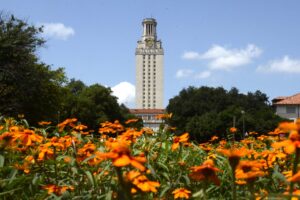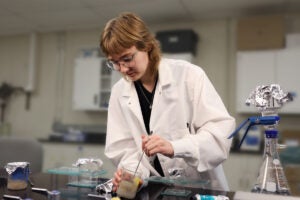When Marissa Duswalt was named a 2009 Truman Scholar, she was cited by the Truman Foundation for her interest in “nutrition, behavioral science, culinary arts, and food culture.” That summary, however, understates the role that food has played in the life of Duswalt, a fourth-year nutrition and Plan II Honors major from Rosenberg, Texas.
“I grew up in the kitchen,” said Duswalt, who as a Truman Scholar will receive up to $30,000 to attend a graduate school of her choice. “My mom, when she immigrated from Mexico, brought with her a lot of from-scratch recipes. She’s always gardened at our house. She’s a phenomenal cook. My grandmother is amazing. I grew up with a really rich culinary heritage.”
When she got to college, it didn’t occur to Duswalt to look to food as a possible focus for her academic career. Instead, she joined the Plan II Honors program, was planning on earning a degree from the College of Liberal Arts, and was interning with an educational policy nonprofit. Her interest in nutrition played out entirely outside of the classroom. She taught cooking classes for her friends. She scoured Austin for the best (and most reasonably priced) restaurants. And she lost a lot of weight.
“I came into college being really overweight,” Duswalt said. “I spent my freshman year losing a lot of the weight that I’d gained as a junior and senior in high school. I’d played sports, and gotten injured, and I kept eating like an athlete without working out like an athlete.”
By the spring of her sophomore year, through a combination of exercise and change in diet, Duswalt had lost 30 pounds. When she enrolled in an introductory nutrition class, her purpose was, in part, to understand the science behind her weight gain and subsequent weight loss. Mostly, though, she just needed to meet the Plan II science requirement.
“I thought, oh, I’ll take an easy class. Well, it wasn’t that easy, and it also really opened my eyes,” she said. “One of the bigger revelations, for me, was portion size. The portion sizes in this country tend to be much bigger than necessary. It’s in the best interests of the food industry, of course, that we eat a lot, but it’s not in our best interests. And what’s amazing is that your body can adapt to smaller portion sizes. In fact, when you change these habits, your body really loves you for it.”
By the end of her sophomore year, Duswalt had decided to supplement her Plan II Honors degree with a degree from the Nutritional Sciences Department in the School of Human Ecology (in the Coordinated Program in Dietetics). She’s also taken a job as a student assistant with the nutrition division of University Health Services. Within a few months, she was helping to revamp their Peer to Peer Nutrition program.
“She coordinated the entire program under me,” said Dr. Lea Gebhardt, the Health Education Coordinator for Nutrition. “I’ve been involved in education for a long time, and I’ve never seen a student like her. She’s so mature. Every day, I’m impressed with her. On top of all of that, she’s incredibly pleasant to be around and has a great sense of humor.”
Working with Gebhardt, Duswalt has developed workshops on good nutrition. She conducts tours of local grocery stores. She’s developed classes in conjunction with Gregory Gymnasium. She also does one-on-one consultations and diet analyses with students answering questions, for instance, about how to manage a vegetarian diet and has trained other students to work as peer educators.
“All forces combined here,” she said. “It started as a really personal thing, but then I started to pick up on what was going on around me, and in particular on the obesity crisis our country is going through right now. Then I got really passionate.”
This year, Duswalt is working in the laboratory of Dr. Stephen Hursting, chair of the Department of Nutritional Sciences, on a study of how the human body metabolizes fructose.
“It seems to be the case,” she said, “that when we metabolize fructose, it doesn’t induce satiety effects in the same way that sucrose does. So you can have as much as you want, and you have no idea you’re full. That’s just one of the many indications that the American diet, based on our ingredients, is dangerous and could be obesity-inducing.”
Last summer, Duswalt went to the Dominican Republic to work on a community garden project at a rural school, and to help integrate the food that’s grown into the kids’ diets.
“The difficulty is finding a degree that combines all of the concerns surrounding nutrition,” she said, “which simultaneously involves cultural, global, economic, scientific and political issues. That’s the thing about nutrition. You’ve got to know where food comes from, how it grows, how we produce it, how we get it, how we eat it, why we eat it, what happens once we eat it. It’s really involved science.”



